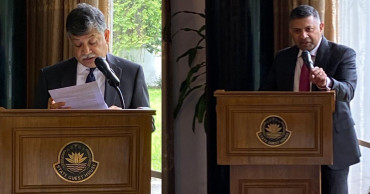Masud Bin Momen
Any conflict, war in region can deviate Bangladesh from achieving its development goals: FS
Reiterating Bangladesh’s position against any kind of war in the world, Foreign Secretary Masud Bin Momen on Thursday said any kind of conflict or war in the region might deviate Bangladesh from achieving its goal of further development.
“Obviously, we don’t want any war, be it real war or proxy war. We are against war,” he said, adding that Bangladesh will not allow anyone to use its land to serve others’ interests or that might go against the interest of its neighbours.
The foreign secretary made the remarks while responding to a question during a year-ending interaction with the members of Diplomatic Correspondents Association, Bangladesh (DCAB) at the Ministry of Foreign Affairs. MoFA Spokesperson Seheli Sabrin was also present.
Journalists play critical role everywhere strengthening democratic institutions: US Embassy
He said Bangladesh is always against any kind of war as common people, women and children suffer from conflicts.
Describing India and Myanmar as Bangladesh’s neighbours, he said Bangladesh’s focus remains on more development and Bangladesh will get deviated from achieving its target if there is any kind of conflict, proxy or otherwise.
“For this reason, we always exercise maximum restraint,” Masud Momen said, noting that there have been provocations when the Rohingya influx began in 2017. “There have been instructions from the top leadership to exercise restraint.”
Responding to a question big powers rivalry, the foreign secretary said Bangladesh is trying its best how to do this balancing act maintaining contact and communication with all the countries.
180 foreign observers applied to EC to oversee polls: MoFA
“We are not making anyone hostile, we are responding timely and responding concerns if any. Many are saying that they want to learn from us. They are happy on how Bangladesh is dealing with all these competing demands and interests,” he said, adding that there is no magic formula.
Regarding the next national election, Masud Momen said the government hopes that there will be a good election. “At this moment, we don't think election will not be free and fair.”
He hoped that people will cast their votes in the election in a festive mood. “There is no reason to get panicked.”
Masud Momen said they are concentrating on how they can help the Election Commission to hold free and fair polls. “We are committed to hold a free and fair election. That's our focus. If there is any problem, we will face that.”
He said they want peace and stability the way the foreign friends want. “We want to follow a peaceful process. Bangladesh is always for peace.”
Responding to a question, the foreign secretary said Bangladesh is not holding election to satisfy any foreigner, but for its constitutional obligation, government’s continuity and people will vote if they want to vote.
He said what a particular country is thinking of or whether any particular country will recognize the polls are irrelevant.
‘Want the entire world to observe our polls and learn from us’: Momen
Earlier on Wednesday, Foreign Minister Dr AK Abdul Momen said they do not want to see any proxy war in the region and highlighted the importance of peace and stability for greater development,.
“Our main goal is that we do not want to see any proxy war here. Problems remain there where we see proxy war despite having resources. Europe has fallen into proxy war and is facing challenges,” he told reporters, noting that there might be efforts to make the countries in the region weaker.
Momen said Bangladesh has taken a leadership role in the region and other countries acknowledge this. “This is good for us.”
2 years ago
Leveraging Bangladesh's strategic location: Foreign Secretary highlights scope of trilateral partnership with India, Japan
Foreign Secretary Masud Bin Momen on Wednesday underscored the potential of a trilateral partnership among Bangladesh, India and Japan -- leveraging Bangladesh's strategic location.
He said this partnership would focus on investment, market development, and enhanced connectivity, with India's growing economy and Japan's capital surplus playing crucial roles.
Speaking at a policy colloquium, the Foreign Secretary also urged Japan to expand its BIG-B initiative for regional prosperity and sustainable development.
Japanese Ambassador to Bangladesh Iwama Kiminori emphasized the rising geopolitical significance of Bangladesh in the global context.
The policy colloquium titled ‘From the Himalayas to the Bay of Bengal: New Possibilities in the Bangladesh, Japan, India Trilateral Partnership’ was held at the Syndicate Hall of North South University (NSU).
The event was organized by the university's Center for Peace Studies (CPS) of the South Asian Institute of Policy and Governance (SIPG).
The session was chaired by Professor Atiqul Islam, Vice-Chancellor of NSU.
Former Foreign Secretary Shahidul Haque; Dr. Selim Raihan, Executive Director of the South Asian Network on Economic Modeling (SANEM); Sabyasachi Dutta, Executive Director of Asian Confluence, India; and Dr. M Jashim Uddin, Associate Professor of Political Science and Sociology at NSU, also spoke at the event.
Dr. Selim Raihan observed that the Bangladesh, Japan, and India partnership could spur economic growth in Bangladesh through improved connectivity, trade efficiency, and infrastructure development.
Highlighting the importance of greater transparency, digitization of customs, and removing non-tariff barriers, Dr. Raihan suggested unrestricted foreign direct investment from Bangladesh to India to stimulate economic integration and industry growth.
Observing that India's northeast region (NER) is a crucial connector for Bangladesh with India and South and Southeast Asia, Dutta said that extensive connectivity in the region can foster a competitive business climate and stimulate regional trade and economic growth.
The colloquium also focused on the challenges that need to be overcome to ensure the success of the trilateral partnership, with a particular focus on border stabilization.
The historical links between Bangladesh and the North East Region (NER) of India and the role of Japan in rejuvenating these connections were also discussed.
During the open dialogue, panelists answered questions from students, faculty, and journalists, moderated by Professor Dr. Tawfique M. Haque, Director, CPS, and SIPG.
Professor Atiqul Islam hoped that the trilateral investment partnership would produce a positive impact for the entire region, encompassing India, Bangladesh, Nepal, and Bhutan.
2 years ago
FS Masud gets 2-year extension as senior secretary
The government has extended the tenure of Foreign Secretary Masud Bin Momen by two more years under a contractual appointment effective from December 6, 2022 or from the date of his joining.
The Public Administration Ministry issued a gazette notification on Wednesday regarding his contractual appointment as Senior Secretary of the government.
Read more: COP27: Bangladesh urges developed nations to double provision of adaptation finance by 2025
Masud joined as Foreign Secretary on 31 December 2019. As a career diplomat, he has long been serving in different capacities at the Headquarters and Bangladesh’s Missions abroad.
Prior to his appointment as the Foreign Secretary, he had been Bangladesh’s Ambassador and Permanent Representative to the United Nations since 2015.
Before that, he served as Bangladesh’s Ambassador to Japan from 2012 to 2015.
Read more: Energy supply to Bangladesh: Turkey will be “more than happy” to be a transit country, says ambassador
He also served as Ambassador to Italy and Permanent Representative to the Food and Agriculture Organization (FAO), World Food Programme (WFP) and International Fund for Agricultural Development from 2008 to 2012.
Masud served at the Headquarters in different capacities. From 2006 to 2008, he was the Director-General in the Ministry of Foreign Affairs, Dhaka and was responsible for matters related to South Asia, the South Asian Association for Regional Cooperation (SAARC), Non-Aligned Movement (NAM), ASEAN Regional Forum (ARF), Human Rights and the United Nations.
3 years ago
Human trafficking hurts lives, country’s image: Foreign Secretary
Foreign Secretary Masud Bin Momen on Thursday said human trafficking is like a cancer in a society that undermines the lives of individuals and future of their families, and tarnishes the country’s image.
“We cannot allow some irresponsible people to slap on the face of the people who are working hard to develop the country,” Masud said.
Bangladeshis are one of the top ten nationals who crossed the Mediterranean Sea during 2014-2022, and such statistics go against the achievements Bangladesh made, he said.
The foreign secretary was talking to journalists at the closing session of a workshop on "Migration and Media" organised by International Organisation for Migration (IOM) in cooperation with Diplomatic Correspondents Association, Bangladesh (DCAB) at a city hotel.
On the bilateral front, the foreign secretary said, they have signed an MoU with Greece that will see Bangladeshi workers migrating to Greece each year in a regular and orderly manner.
Under the MoU, Greece will create employment for 4,000 new Bangladeshi workers each year by providing them with temporary work permits for five years, he said.
"We hope to see a sharp decline in illegal migration and trafficking of Bangladeshi workers," Masud said.
Also, similar arrangements are on the way with Italy, Malta and a number of European countries, he said.
Bangladeshis were found as irregular migrants reaching the shores of Italy in the first six months this year.
Of the 28,405 irregular migrants in the first six months this year, there were a total of 4,606 Bangladeshis followed by Egyptians, Tunisians, and Afghans.
They take risky boat journeys in the Mediterranean sea to reach Europe and many of them die.
Read: Bangladesh wants discussion to avert border tension with Myanmar: Foreign Secretary
“We need to empower our workers with skills," Masud said adding that if the workers are not empowered there are more scopes for abuses.
Despite sustained efforts, human trafficking continues to thrive through trans-national networks.
"We need to work on prevention, interception and prosecution on both ends of the spectrum. Here, media can play a constructive role to educate our people about the risk of choosing irregular pathways of migration," said the foreign secretary.
Media can empower migrants and the communities they live to shape positive public perceptions about migration and migrants, he said.
"We should remain committed collectively to harnessing the benefits of sound human mobility for the sustainable development of our peoples and the planet," he said.
Former foreign secretary and Senior Policy Advisor IOM Bangladesh Shahidul Haque said while there are socio-economic factors for migration, climate change and conflicts are becoming major reasons for migration recently.
Bangladesh has played important role at the international level, especially in having the Global Compact on Migration in place, a UN-led global deal, but migration governance at home is not in a very good shape, he said.
Haque said Bangladesh should not be seen only as a source country of migrant, but it is also a receiving and transit country.
EU Ambassador to Bangladesh Charles Whiteley said EU is working on finding legal migration pathways for Bangladeshis, alongside other nationalities.
It has been supporting and will continue to do so to Bangladesh to improve migration governance and reintegration efforts as it is doing under the Standard Operating Procedures now under the project PROTTASHA.
IOM Bangladesh Chief of Mission Abdusattor Esoev and Diplomatic Correspondents Association, Bangladesh President Rezaul Karim Lotus also spoke.
3 years ago
Masud Bin Momen bids farewell to Doraiswami
Foreign Secretary Masud Bin Momen Sunday hosted a farewell lunch for outgoing Indian High Commissioner to Bangladesh Vikram Kumar Doraiswami.
During the farewell speech, the foreign secretary called him a true friend of Bangladesh.
"A career-defining honour to have served my country in this most vital and vibrant relationship," said Doraiswami.
Read: PM likely to attend Queen’s state funeral
The envoy added that the foreign secretary has been a "gracious and helpful" partner, whose gentle humour and friendship he will miss.
Pranay Kumar Verma, now the Indian ambassador to Vietnam, has been appointed as the next high commissioner of the country to Bangladesh.
Verma is expected to take up the assignment shortly.
3 years ago
Dhaka seeks Washington’s support in Rohingya case with ICJ
Bangladesh has urged the United States to extend their support regarding the Rohingya case with the International Court of Justice (ICJ) in The Hague brought by The Gambia under the genocide convention.
Bangladesh also thanked the US side as it has decided to extend their support to the Rohingyas now living in Bhasan Char.
“We thank them (US side) as they will extend their support to the Bhasan Char,” Foreign Secretary Masud Bin Momen told reporters at the Foreign Service Academy while briefing about his discussion with US Assistant Secretary of State for International Organization Affairs Michele J. Sison on Monday.
He said Bangladesh also thanked the US side recalling that they (US) in March determined members of the Myanmar military committed “genocide and crimes against humanity” against Rohingya following a rigorous factual and legal analysis.
“The issue of third country resettlement also came up in the discussion,” said the foreign secretary.
He said Bangladesh reiterated that repatriation of the Rohingyas to their place of origin in Rakhine State in a safe and dignified manner would be the key solution.
Read: Bangladesh receives more doses of Pfizer COVID-19 vaccine from US
Foreign secretary Masud said Bangladesh does not subscribe to any idea of long-term hosting of the Rohingyas in Bangladesh and urged the international community to focus on their immediate safe return to Myanmar.
The Organization of Islamic Cooperation (OIC) has welcomed the ruling by the ICJ in The Hague on July 22, rejecting Myanmar’s preliminary objections to the case brought by The Gambia under the 1948 Convention on the Prevention and Punishment of the Crime of Genocide (Genocide Convention).
Responding to a question on elite force Rab, the foreign secretary said Bangladesh keeps working for withdrawal of sanctions on Rab following their legal process.
Inspector General of Police (IGP) Benazir Ahmed and other officials are scheduled to attend the third United Nations Chiefs of Police Summit at the UN headquarters in New York on August 31-September 1.
Asked whether he will face any visa related problem due to US sanctions, the foreign secretary said they are yet to communicate and will try to know beforehand, noting that there are some exceptions.
Read: ASEAN Dhaka Committee celebrates 55th ASEAN Day
He said they are discussing the loopholes and any inconsistency in the Digital Security Act (DSA) for its further improvement in terms of application so that no one faces any problem.
Masud said they discussed multilateral issues to strengthen cooperation in a number of areas including food security, health and human rights issues and discussed events during the high-level week of the UNGA.
He said the US side was very amazed to see vaccination of such a large number of people in Bangladesh and the US side is keen to do an event on Covid front.
Sison said the US is committed to strengthening cooperation for the full implementation of the Sustainable Development Goals (SDGs) in Bangladesh.
She said discussion on cooperation and coordination with UN agencies in Bangladesh is critical to this effort.
Sison arrived here on Saturday evening as part of her tri-nation visit (India, Bangladesh and Kuwait) for consultations on a range of US multilateral priorities, including combating food insecurity, advancing global health, addressing human rights and humanitarian needs, peacekeeping and peacebuilding, and support for Rohingya refugees.
Her meetings with senior government officials focused on opportunities to deepen their cooperation at the United Nations, and US support for the candidacy of Doreen Bogdan-Martin to become the next Secretary-General of the International Telecommunication Union.
The US Assistant Secretary exchanged ideas on how the United States and other countries can collaborate on achieving the Sustainable Development Goals.
She has already visited India and will go to Kuwait from Dhaka as part of her tri-nation visit that will end on August 10.
3 years ago
Jaishankar leaves Dhaka after his "positive discussions" with leaders
Indian External Affairs Minister S Jaishankar on Friday left Dhaka for Bhutan after his "positive discussions" in Bangladesh.Foreign Secretary Masud Bin Momen saw him off at BAS Base Bangabandhu on Friday morning as he left for Paro by a special flight of Indian Air Force.Indian High Commissioner to Bangladesh Vikram Kumar Doraiswami was also present.
Also read: Growing Dhaka-Delhi interactions good reflection of trust: JaishankarDuring his brief stay in Dhaka, Jaishankar met Prime Minister Sheikh Hasina at her official residence Gonobhaban on Thursday afternoon and invited her to visit India on behalf of Prime Minister Narendra Modi.
3 years ago
Dhaka keen to build comprehensive partnership with Washington: FS
Foreign Secretary Masud Bin Momen on Sunday said Bangladesh has high expectations from the Biden Administration in terms of building a “comprehensive partnership” as the two countries want to do more to take the relations to the next level.
“This is what we’ve told our US colleagues today. Bangladesh will remain keen in this regard, with the view to work closely with the US in our journey together towards peace and prosperity,” he told reporters at a joint briefing at state guesthouse Padma after the 8th Partnership Dialogue between the two countries.
US Under Secretary for Political Affairs Victoria Nuland, who led the US side, said they have already a “very strong” 50 years of partnership and the two countries can do even more together.
Also read: Partnership Dialogue: US calls sanctions on Rab a complicated issue
She said they can do more in the area of growing business and trade, in terms of technology infrastructure, resilience of two economies, in the area of security.
Nuland said they are really pleased to be back in town to “energize and deepen” their already very strong partnership and termed Sunday’s discussion just the “appetizer” on a “very big feast” that we are going to have this year with a number of engagements.
Masud said this year’s Partnership Dialogue is especially significant for two reasons - firstly, the two countries will be soon celebrating the 50th anniversary of the establishment of diplomatic relations.
And secondly, he said, the COVID-19 pandemic barred them from holding the regular dialogue mechanisms in the last two years.
The foreign secretary said Foreign Minister AK Abdul Momen will be holding a bilateral meeting with US Secretary of State Antony Blinken on April 4 in Washington.
3 years ago
Foreign Secretary to visit India soon
Foreign Secretary Masud Bin Momen is scheduled to visit India later this month to attend a number of events in Chennai and New Delhi.
The Foreign Secretary will first go to Chennai on February 23 from where he will head towards New Delhi.
In Chennai, Masud Momen will formally inaugurate the Bangladesh Deputy High Commission, a diplomatic source said.
The Foreign Secretary is likely to hold bilateral talks with his Indian counterpart Harsh Vardhan Shringla on February 24.
In December last year, Indian Foreign Secretary Shringla visited Bangladesh and said India will cooperate increasingly with Bangladesh noting that the next fifty years of the two countries' shared journey will bring even greater satisfaction for both sides.
4 years ago
Bangabandhu Corner opened in Islamabad
Foreign Secretary Masud Bin Momen Saturday inaugurated a Bangabandhu Corner at the Bangladesh High Commission in Islamabad.
The corner has been adorned with inscriptions and photographs and books and publications on Father of the Nation of Bangladesh Bangabandhu Sheikh Mujibur Rahman.
4 years ago





.jpg)
.jpg)
.jpg)
.jpg)






